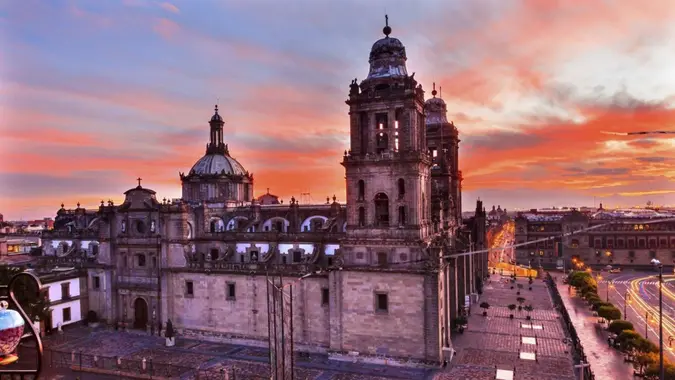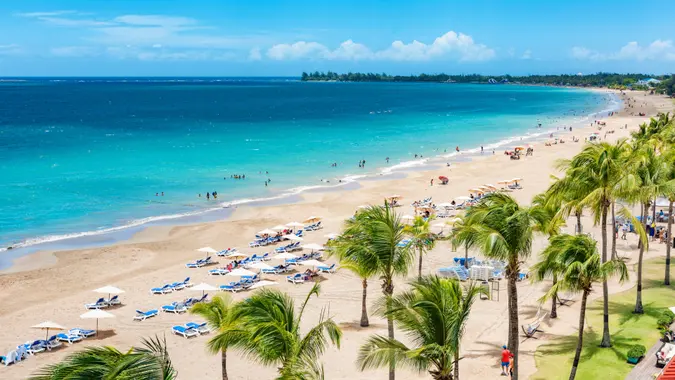4 Hidden Costs in Your Plane Ticket You May Not Realize

Commitment to Our Readers
GOBankingRates' editorial team is committed to bringing you unbiased reviews and information. We use data-driven methodologies to evaluate financial products and services - our reviews and ratings are not influenced by advertisers. You can read more about our editorial guidelines and our products and services review methodology.

20 Years
Helping You Live Richer

Reviewed
by Experts

Trusted by
Millions of Readers
If you ever look closely at the itemized receipt for your airline ticket, you might be shocked at just how many miscellaneous fees and charges are added to your fare. Factor in the service fees you pay for “add-ons” to your ticket and your total cost of travel can be significantly above the base fare, which is what the airline itself actually earns.
Here’s a look at the most common “hidden costs” that go into your plane ticket, along with some suggestions on how you can minimize them.
Taxes and Fees
Airlines aren’t generally responsible for tacking on taxes and fees to your plane ticket. Rather, most taxes and fees are government- or airport-imposed. While the specific taxes and fees you pay may vary from ticket to ticket, here are the typical ones you should expect to pay, using American Airlines as an example.
For American Airlines domestic tickets, in addition to the base fare and any carrier-imposed fees (see below), you’ll be assessed the following:
- A 7.5% U.S. government excise tax
- A September 11th Security Fee of $5.60 per one-way trip, per passenger
- Airport passenger facility charges (PFCs) of up to $18 roundtrip
- A U.S. government excise tax of $4.00 on each flight segment, which is defined as one takeoff and one landing
- For Hawaii/Alaska, the U.S. government excise tax is $8.90
For American Airlines international flights, fees and taxes are as follows:
- A September 11th Security Fee of $5.60 per one-way trip, per passenger
- Airport passenger facility charges (PFCs) of up to $18 roundtrip
- Other government taxes and fees (including U.S. government excise tax) of up to $240 based on destination; this total can vary due to currency fluctuations
U.S. government excise tax is used to pay for things like airport construction and airway safety and operations.
Carrier-Imposed Charges
Carrier-imposed charges can literally be anything the airline chooses to attach to your ticket. However, “carrier-imposed charges” are generally fuel surcharges, which came into vogue after an oil price spike in 2004.
Since then, however, carriers seem reluctant to eliminate or even reduce them, regardless of what the price of oil — which drives the price of jet fuel — is doing. These carrier-imposed charges are most noticeable on award tickets, which are ostensibly “free” if you have enough miles — but in reality often cost hundreds of dollars.
Change or Cancellation Fees
Change and cancellation fees vary widely by airline and situation. Some airlines, like United, have relatively recently implemented a “no-change-fee” policy on most fares, with the exception of Basic Economy.
However, other airlines charge substantial change fees, particularly on international itineraries. For example, Delta Airlines charges anywhere from $0 to $400 to change a ticket, depending on your travel route. Note that these change fees are in addition to any increase in fare that may apply to your new ticket.
Service Fees
Service fees, as the name implies, are assessed if you choose any “extras” on your flight. Of course, what the airlines define as an “extra” nowadays was often complimentary in the past.
For most airline tickets, you should now expect to pay an extra service fee for everything from choosing your seat to checking baggage. You may have to pay a fee if you book an award ticket or if you use the assistance of an agent on the phone. Some airlines charge a fee to carry a bag on the plane or even to print out your boarding pass.
Suggestions To Minimize Fees
There are some fees you simply can’t avoid if you want to fly on an airline, such as the various government fees and taxes outlined above. Many others can be avoided, though, or at least minimized.
As the airline industry is extremely competitive, the cost of doing business with an airline can vary significantly. Southwest, for example, allows two free checked bags with every ticket, something few other carriers still offer. United, as mentioned above, allows free changes on every ticket. And most airlines have loyalty programs that provide numerous perks to elite members, ranging from free award ticket bookings or changes to free baggage.
You can also save money by picking and choosing the services you really need. If you don’t want to pay a baggage fee, for example, see if you can fit what you need into a carry-on — assuming your airline allows free bags on board. Even airlines that charge a fee to pick a seat usually waive those at the time of check-in, typically 24 hours before flight time.
Finally, always check to see if the “bargain fare” you’re thinking about tacks on extras for things like printing out a boarding pass.
 Written by
Written by  Edited by
Edited by 

























